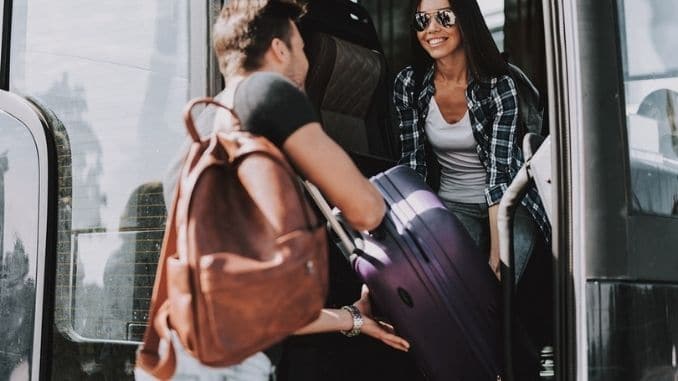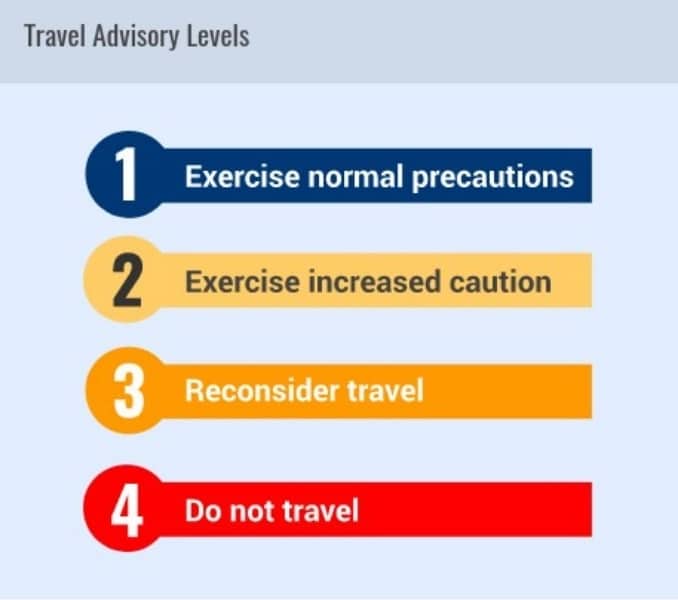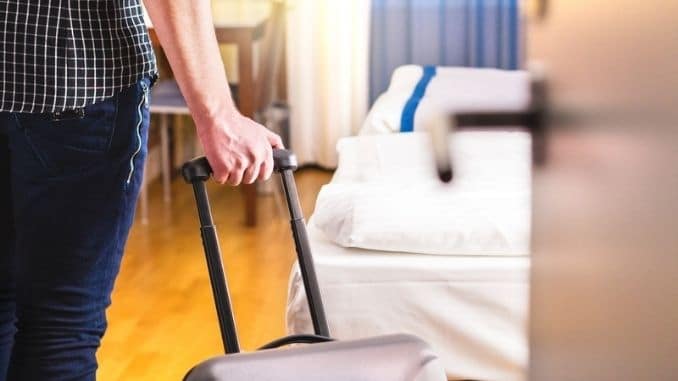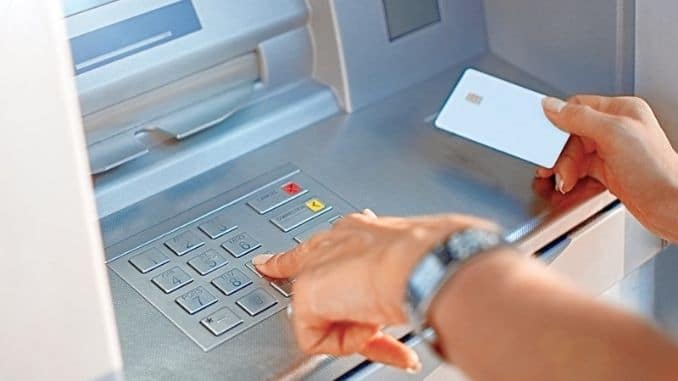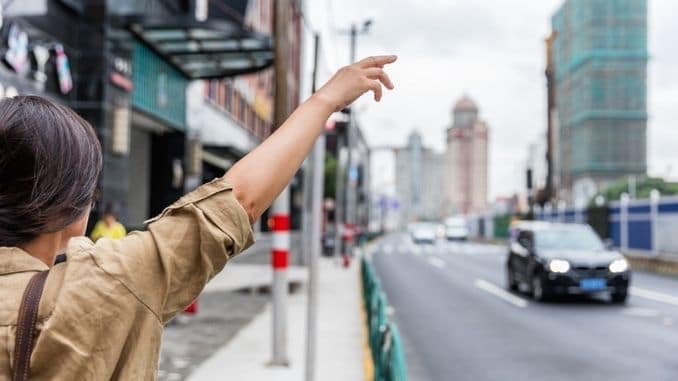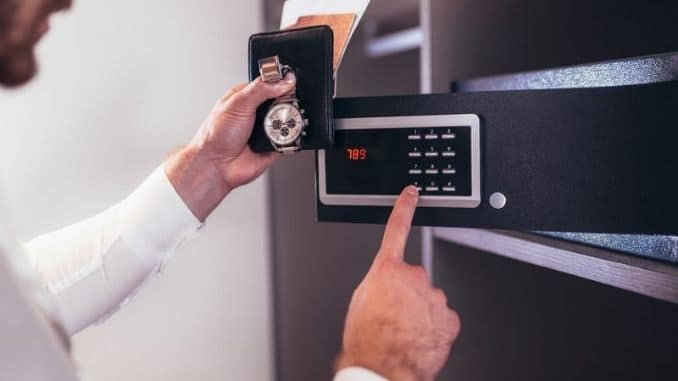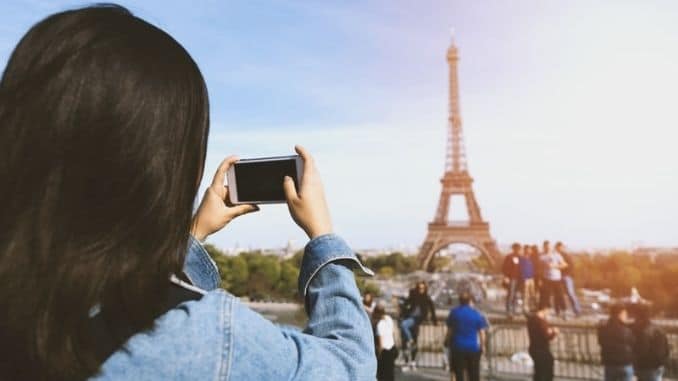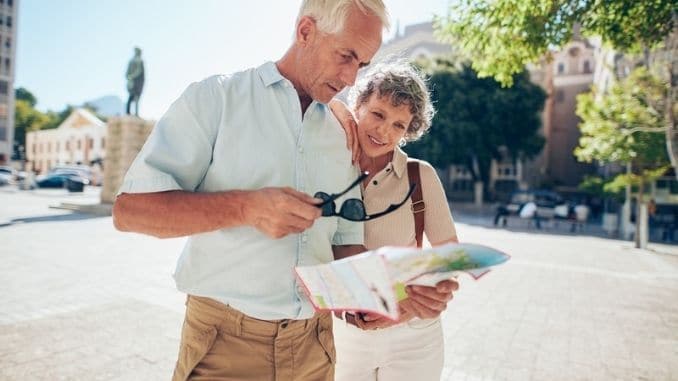
Most people enjoy traveling. It’s a lot of fun to get out of your hometown and enjoy the surroundings of a new place. Whether you’re traveling across the state or to a foreign country, it’s important to keep yourself safe.
Here’s a list of 20 useful tips to help you stay safe while you travel.
1. Research the Area
You can find all sorts of good safety information when you search for your destination online. Enter terms like “areas to avoid in Miami,” or “tourist safety in Paris.” There’s a wealth of information, crime statistics, local scams and useful local safety information that you’ll need to know before you head out.
If you plan to leave your home country, make sure you look at the United States Department of State – Bureau of Consular Affairs website (travel.state.gov) before you book your airline tickets. This website has extensive and up to date information on the safety of most locations throughout the world. They use a one to four rating system. If a country or location is rated level one, that means it’s safe to travel to that country. The State Department advises you to “Exercise normal precautions.” But put on the breaks if they give the country a rating of level four, which means, “Do not travel.”
(Image credit: U.S. Department of State – Bureau of Consular Affairs)
2. Don’t Post Your Travel Plans
It’s tempting to post about your exciting, upcoming trip to the beach on social media, but don’t. When you make your travel plans public, you put yourself in a very vulnerable spot. Not only are you letting your local friends (and friends of friends) know that your house is going to be empty during your upcoming travel dates, but you’re also alerting strangers as to where you’ll be for two weeks. Identity thieves, pickpockets, rapists, and other unsavory types know that vacationers tend to carry cash and might be sidetracked by the scenery. Don’t advertise your travel plans on social media, blogs or in any other public online forum. If you absolutely must share the 700-plus photos that you snapped on your trip, do it once you are back home and safe.
3. Buy a Lock for Your Luggage
While some folks will tell you that luggage locks are useless, I recommend them if you plan to carry valuables. Consider this scenario: You’re traveling for work. You have your company credit card and your work laptop with you. During your 90-minute layover, you remove your computer to put the finishing touches on your presentation. You’ve just put your laptop and $60 cordless earbuds in your carryon bag, and you’d like to close your eyes for a bit while you wait for your flight to board. If you’ve got a decent lock for your bag, you’ll be able to secure it and relax for 20 minutes. Without one, you’ll need to stay alert to guard your bag against any shady folks who might have seen you stow your electronics.
It’s wise to buy Transportation Security Administration (TSA)-approved locks to avoid the hassle of having to unlock them manually for each safety check at the airport. TSA-approved locks are helpful because the TSA has a universal key to open them if they want to inspect the contents. Search “TSA approved luggage lock” online to find one.
4. Book an Upstairs Room
When you’re booking hotel accommodations, request a room that’s high up in the hotel. When thieves are looking for travelers leaving their rooms, they’ll most likely be snooping around on the ground floor. Thieves can break into ground floor rooms and then hurry out of the building quickly. An upstairs room requires a bit more work and takes longer. Opt for a room that’s a few stories up to be safe.
5. Consider Packing a Portable Door Lock or Alarm Doorstop
Safety Tips for Traveling: When you’re staying at a hotel, the cleaning staff, maintenance personnel, and other hotel employees have master keys to access your locked room at their discretion. To ensure that you’re not a victim of a shady hotel employee, pick up a portable door lock for your hotel stay.
These little gadgets cost about $10. They are installed easily without any tools and provide an added bit of security as you sleep away from home.
Alarm doorstops are also terrific for hotel rooms. You install these at the bottom of the door, and an alarm sounds if the door is opened. It’s a nice extra level of security and particularly important when you’re traveling alone.
6. Use ATMs That Are Inside of Banks to Withdraw Cash
Criminals looking to steal money directly from your bank account can install a card reading device onto the face of an ATM. These devices, which are called skimmers, are very difficult to detect because they look like part of the machine. The skimmer records your card number and personal identification code so that the thief can use it to steal your money.
Avoid this risk entirely by using ATMs that are located inside of banks or go directly to the teller to withdraw cash.
7. Research Local Hospitals and Emergency Protocol
Safety Tips for Traveling: Particularly when you’re traveling outside of your home country, make sure you’re aware of the local emergency and nonemergency police phone numbers. Also, familiarize yourself with the closest hospital or urgent care facility.
At the U.S. Department of State website, there is an extensive fact sheet for most navigable countries. You can search the name of your destination and find the emergency numbers, learn about any special laws or vaccine requirements and find contact information for your country’s embassy. Write down all of this information on an index card. Then, take a picture of the card with your smartphone. Keep the hard copy on your person so that even if your phone is lost or the battery is dead, you’ve got emergency information on hand.
8. Don’t Get Drunk or Impaired
Safety Tips for Traveling: It’s nice to party with the locals but watch yourself. Travelers often become victims when they allow themselves to drink too much or use substances that may cause them to become intoxicated.
9. Learn Important Phrases in the Local Language
Knowing how to ask for help or tell someone your wallet has been stolen can be very helpful when you’re in a foreign country. Take some time to research a few meaningful phrases online before you leave home.
10. Use Only Registered Taxis or Rideshare Companies
In some areas, drivers will put counterfeit taxi signs on their cars and offer transportation services illegally. Check with your hotel concierge to find a list of registered taxis and rideshare providers in the area. Stick to only legitimate transportation services.
11. Take Pictures of the Fronts and Backs of Your Documents
It may seem like an unnecessary step but, before you leave, take out all of your credit cards, passports, and other important documents and take photos of the fronts and backs with your phone. Be sure to keep your phone password-protected. If you don’t have a good camera on your phone, do it the old-fashioned way and make front and back copies. If anything gets lost or stolen on your trip, you’ll be so glad you took the time to record the information.
12. Consider a Money Belt for Cards, Cash and Passport
Safety Tips for Traveling: Travelers often have plenty of cash on hand. That’s why they’re such excellent targets for thieves. A money belt is a kind of like a very slim version of a fanny pack that you can wear against your body, under your clothes. You can conceal the bulk of your cash and debit card in the belt. Keep a few bucks in your pocket or purse to pay for items on the street. This way, you won’t have to flash your whole wad of cash each time you pay for small items.
13. Use the Hotel Safe or Locker for Most of Your Money and Valuables
Take advantage of your in-room hotel safe. If that’s not provided, inquire at the front desk. Often, the desk provides lockers and will take responsibility for valuable items.
14. Carry a Deterrent
When you’re traveling, a can of pepper spray is an easy and effective self-defense item to keep on hand. Check online to make sure defense sprays are legal in the area you plan to visit. If not, consider carrying a personal alarm or a whistle.
15. Wear Sensible Clothing
It may cramp your style but consider wearing comfortable shoes and sensible clothing on your vacation. You may need to run or protect yourself. Before you pack it, ask yourself if you could run in the outfit or pair of shoes. If not, leave it at home.
16. Take a Rideshare or Taxi Rather Than Walking in an Unfamiliar Area
Spend money on transportation to keep yourself safe. If your hotel is just six blocks away, but you’re in an unfamiliar area and it’s dark, call for a ride. It’s always best to err on the side of caution.
17. Make a Check-in Policy With Someone at Home
Tell a friend at home about your travel plans. Then, make a deal with them that you’ll call or text once you arrive and every few days while you’re gone. If your friend doesn’t hear from you and can’t get in touch with you, he or she will know that there’s a problem and can contact authorities.
18. Travel Insurance May Be Helpful
Safety Tips for Traveling: Consider buying travel insurance for your trip. Travel insurance can help cover medical bills if you get sick while you’re traveling. It can cover lost or stolen luggage, unexpected cancellations, lost passports, emergency assistance, and other unfortunate situations. Talk with your insurance agent before you leave to get more information and buy a policy.
19. Act Like a Local
Do your best to fit in. Criminals can spot a tourist from a mile away. They look for flip-flops, flowered shirts, souvenir caps, and fanny packs. Once they see you’re not a local, they may try to swipe your wallet. Do a little research on the local fashion and try to look the part.
20. Trust Your Gut
Safety Tips for Traveling: If you don’t feel right about getting in a particular cab or the hair on the back of your neck stands up when you get to the front desk at the motel, trust your instincts and make other arrangements. Many times, when something doesn’t feel right, it isn’t right. It’s always better to be safe than sorry.
The best location, fanciest hotel, and perfect travel itinerary are of very little importance if you’re the victim of a crime during your trip. Keep these tips in mind as you enjoy your vacation and stay safe.
For your guide to the best foods for your body, check out The Best Foods that Rapidly Slim & Heal in 7 Days, here!

